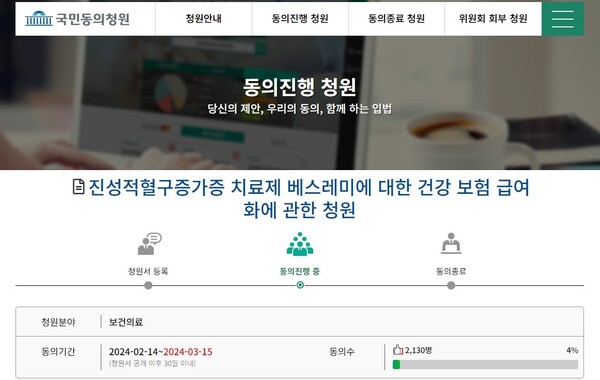A petition was posted on the National Assembly website on Wednesday, calling for the insurance coverage of Besremi (rofeginterferon alfa-2b), a new drug to treat patients with chronic myeloproliferative blood cancer like polycythemia vera, essential thrombocythemia, and myelofibrosis.
"I am petitioning for reimbursing Besremi, the only treatment that will save the lives of patients with chronic myeloproliferative diseases," said the petitioner, surnamed Kim, who suffers from chronic myeloproliferative blood cancer. "Chronic myeloproliferative disease, called polycythemia vera (PV), is a rare but deadly type of blood cancer, and Besremi is the only treatment currently available."

However, most patients with myeloproliferative blood cancers cannot use the new drug due to the unaffordable cost of treatment.
"The cost of about 4 million won ($3,000) per month prevents most patients from receiving treatment," Kim said. "I am struggling with the pain of despair that I have a disease that cannot be cured and the pain of not being able to receive treatment due to the burden of treatment costs even though a new drug has been developed. Please let us have equal access to treatment for chronic myeloproliferative blood cancer.”
Most patients who cannot use Besremi are treated with chemotherapy drugs developed in the 1970s, which have serious side effects.
"We suffer from an unfamiliar ailment named myeloproliferative disease with no proper treatment or management," Kim said. "We live with constant anxiety and stress because the disease has the potential to progress to more serious blood cancers, such as myelofibrosis and myeloid leukemia. The treatment options currently available to us rely on chemotherapy drugs that are more than 50 years old and have significant side effects."
The side effects of myeloproliferative blood cancer drugs include headaches, anemia, lethargy, skin discoloration, high blood pressure, hair loss, and blurred vision, which can progress to diseases such as skin cancer and leukemia if taken for long periods, Kim explained. New drugs are now available that can help patients avoid these side effects, but most patients are afraid to take them because they can't afford the monthly cost of about 4 million won.
"In this situation, a drug called Besremi, developed by Taiwanese pharmaceutical company PharmaEssentia, has given us new hope. While existing anticancer drugs focus on simply controlling blood levels, Besremi has proven its effectiveness as a real cure through clinical trials," Kim said. "However, it was rejected in the 2023 reimbursement review and is not covered by insurance, so patients must pay a huge monthly cost of about 4 million won.
As a result, most patients cannot benefit from the new drug. Even patients who have started treatment out of desperation are at risk of falling into the “medical poor,” Kim pointed out.
"The high price also burdens patients who have started treatment without coverage. The cost of treatment for a year is about 48 million won," Kim said. "This cost is also reduced by PharmaEssentia's free service for one dose. It's frustrating to spend the equivalent of an individual's annual income on treatment."
Kim reiterated that patients with myeloproliferative blood cancer, a rare blood cancer, are in dire need of access to new treatments.
"All patients deserve equal access to treatment. What we need is not just access to treatment, but the hope that we can overcome the anxiety of disease progression and get on with our lives," Kim said, calling for the authorities to listen to the voices of rare blood cancer patients who are desperate for Beslimi coverage.

